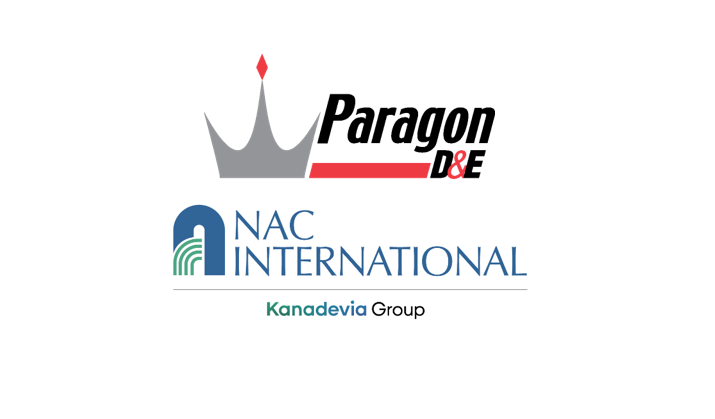NAC International Obtains NRC Approval of MAGNASTOR License Amendment for Metal Storage Overpack Option
January 19, 2023

Peachtree Corners, GA, January 19, 2023 – NAC International Inc. (NAC) has received U.S. Nuclear Regulatory Commission (NRC) approval for a new Metal Storage Overpack (MSO) option for its MAGNASTOR® dry cask storage system technology, further expanding its ability to securely and efficiently store spent nuclear fuel. The latest innovation leverages MAGNASTOR’s capabilities to accommodate dry spent fuel canisters in a new MSO that provides excellent shielding and structural protection. The MSO enables users to implement a more compact storage facility and reduce the associated facility costs.
The NRC approved the MSO under Amendment No. 10 to the Certificate of Compliance 72-1031 for the MAGNASTOR cask system. The new MSO design, adaptable to existing ancillary equipment, provides flexibility to accommodate new spent fuel canister designs and other high level waste contents consistent with an advanced integrated waste management strategy, a core objective of NAC’s technology development efforts. The MSO was conceptualized by NAC and Doosan Enerbility for international applications and applies to the Korea Dry Cask Storage industry as an alternative to concrete storage systems. The Doosan Enerbility and NAC teams cooperatively designed and engineered the solution; and, in December 2019, NAC filed the amendment application with the U.S. NRC for design certification. This initiative is the latest in a series of cask design and fabrication collaborations undertaken by NAC and Doosan Enerbility since the 2015 signing of a cooperation agreement for the joint development of spent nuclear fuel storage systems.
“NAC, in collaboration with Doosan Enerbility, successfully pursued this Amendment 10 adding the Metal Storage Overpack for end-users to consider based on their internal requirements and preferences. Currently, other amendments are underway as we consistently remain initiative-taking in expanding MAGNASTOR’s capabilities for readiness to meet emerging needs,” said Kent Cole, NAC President and CEO.
NAC’s leading-edge MAGNASTOR system (U.S. Patent No.: 8,630,384 B2) is the first and most widely deployed ultra-high-capacity canister system installed at U.S. PWR commercial nuclear power plants. To date, 211 PWR MAGNASTOR systems have been loaded and are in service safely storing spent fuel at operating and shutdown sites.
About NAC International
NAC International Inc. (www.nacintl.com) is a diversified corporation specializing in developing and licensing technology and providing full scope services for used nuclear fuel and radioactive materials packaging, storage, transport, and management. Since 1968, NAC has been a leader in providing solutions and services to the nuclear industry throughout the world, working with both government and commercial organizations. NAC has been contracted to supply over 735 used fuel dry storage cask systems worldwide and has completed more than 3,750 used fuel shipments. NAC provides a broad range of fuel cycle-related consulting and information services to clients worldwide. NAC maintains its corporate headquarters in Peachtree Corners, Georgia. NAC is a wholly-owned subsidiary of Hitachi Zosen Corporation, a global leader in design and construction of environmental systems, industrial plants, industrial machinery, process equipment, infrastructure-related equipment, disaster prevention systems, and precision machinery.
The NRC approved the MSO under Amendment No. 10 to the Certificate of Compliance 72-1031 for the MAGNASTOR cask system. The new MSO design, adaptable to existing ancillary equipment, provides flexibility to accommodate new spent fuel canister designs and other high level waste contents consistent with an advanced integrated waste management strategy, a core objective of NAC’s technology development efforts. The MSO was conceptualized by NAC and Doosan Enerbility for international applications and applies to the Korea Dry Cask Storage industry as an alternative to concrete storage systems. The Doosan Enerbility and NAC teams cooperatively designed and engineered the solution; and, in December 2019, NAC filed the amendment application with the U.S. NRC for design certification. This initiative is the latest in a series of cask design and fabrication collaborations undertaken by NAC and Doosan Enerbility since the 2015 signing of a cooperation agreement for the joint development of spent nuclear fuel storage systems.
“NAC, in collaboration with Doosan Enerbility, successfully pursued this Amendment 10 adding the Metal Storage Overpack for end-users to consider based on their internal requirements and preferences. Currently, other amendments are underway as we consistently remain initiative-taking in expanding MAGNASTOR’s capabilities for readiness to meet emerging needs,” said Kent Cole, NAC President and CEO.
NAC’s leading-edge MAGNASTOR system (U.S. Patent No.: 8,630,384 B2) is the first and most widely deployed ultra-high-capacity canister system installed at U.S. PWR commercial nuclear power plants. To date, 211 PWR MAGNASTOR systems have been loaded and are in service safely storing spent fuel at operating and shutdown sites.
About NAC International
NAC International Inc. (www.nacintl.com) is a diversified corporation specializing in developing and licensing technology and providing full scope services for used nuclear fuel and radioactive materials packaging, storage, transport, and management. Since 1968, NAC has been a leader in providing solutions and services to the nuclear industry throughout the world, working with both government and commercial organizations. NAC has been contracted to supply over 735 used fuel dry storage cask systems worldwide and has completed more than 3,750 used fuel shipments. NAC provides a broad range of fuel cycle-related consulting and information services to clients worldwide. NAC maintains its corporate headquarters in Peachtree Corners, Georgia. NAC is a wholly-owned subsidiary of Hitachi Zosen Corporation, a global leader in design and construction of environmental systems, industrial plants, industrial machinery, process equipment, infrastructure-related equipment, disaster prevention systems, and precision machinery.



